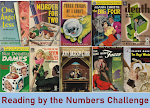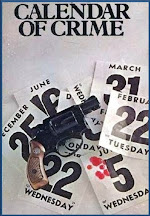This week's Historical Experts:
Brad @ Ah Sweet Mystery Blog: "Coming Home: Two Examples from Christie's Post-War England"
Kate @ Cross Examining Crime: "War Mysteries"
JJ @ The Invisible Event: "Finding Satan in the Subtleties (if not the book) of The Devil in Velvet (1951) by John Dickson Carr"
The Puzzle Doctor @ In Search of the Classic Mystery Novel: "The Death of the Read King by Paul Doherty"
Moira @ Clothes in Books: "The 1950s Again"
Previous Posts
Week #1 Post
Week #2 Post
Week #3 Post
**************
My entry may be a bit of a cheat this week. But life here on the Block has been all sorts of horri--er--crazy and my plans to do a comparison between Dorothy L. Sayers Wimsey books (from the period) and David Roberts' Lord Corinth books (historically set in Wimsey's time) have gone right out the window. Partly due to the fact that my local library seems to think it a brilliant idea to have the last three books of the Corinth series but NOT the earlier books. Hmph!

Sorry...back to business. It will be brief--but I do have a small connection to our History & Mystery topic. My most recent read was Sax Rohmer's The Dream-Detective (click for general review). As mentioned in the write-up, this book does not feature Rohmer's most notable character, Dr. Fu Manchu and focuses on antiques dealer Moris Klaw. Klaw also has a deep interest in the mysteries of the Orient and ancient Egypt and several of the short stories in this collection rely on knowledge of the past--whether it is the history of a famous jewel or the legends surrounding a valuable vase and an Athenian harp or the mysteries of the followers of Isis. Klaw's theory of the Cycle of Crime helps him to see patterns from the past in the crimes and conundrums of the present. It makes for an interesting collection of stores--though some of Klaw's deductions may need to be taken with a grain of salt.































No comments:
Post a Comment